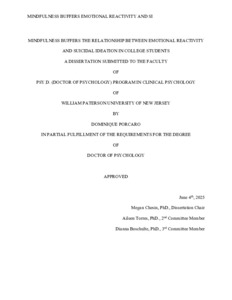Please use this identifier to cite or link to this item:
http://hdl.handle.net/20.500.12164/3499Full metadata record
| DC Field | Value | Language |
|---|---|---|
| dc.contributor.author | Porcaro, Dominique | - |
| dc.date.accessioned | 2025-07-03T17:24:43Z | - |
| dc.date.available | 2025-07-03T17:24:43Z | - |
| dc.date.issued | 2025-06-24 | - |
| dc.identifier.uri | http://hdl.handle.net/20.500.12164/3499 | - |
| dc.description.abstract | Suicidal ideation and behaviors (SIBs) are prevalent among college students, with prior engagement in suicidal ideation (SI) increasing the risk of future engagement in SIBs. Emotional reactivity has been identified as a significant correlate of SI specifically, with a strong positive association established between the two. While resilience has been shown to moderate this relationship, limited research has examined whether mindfulness also serves as a buffer between emotional reactivity and SI. This study investigated whether mindfulness and resilience moderated the relationship between emotional reactivity and SI in a sample of 757 emerging adult college students from a diverse public university. Survey data measuring mindfulness, resilience, SI, and emotional reactivity was collected and then analyzed using Hayes’ (2022) PROCESS macro (Model 2). Findings revealed that mindfulness significantly moderated the emotional reactivity–SI relationship (βER*mindfulness = -.005, p < .001). Simple slope analysis revealed a significant association between emotional reactivity and SI at low levels of mindfulness (β = .07, p < .001), while a weaker, nonsignificant association was found at high levels of mindfulness (β = -.01, p = .445). A Johnson-Neyman post-hoc analysis also indicated that this relationship was significant when mindfulness was at or below the mean but became nonsignificant when mindfulness was at 1.2 standard deviations above the mean or higher. Resilience did not significantly moderate the emotional reactivity–SI relationship (βER*resilience = .00, p = .94). These findings suggest mindfulness is a protective factor against SI in college students with heightened emotional reactivity, suggesting that mindfulness-based interventions (MBIs) may help mitigate suicide risk. Future research should explore interventions to enhance mindfulness and reduce SI in emotionally reactive college students specifically. | en_US |
| dc.format.extent | 37 pages | en_US |
| dc.language.iso | en_US | en_US |
| dc.publisher | William Paterson University | en_US |
| dc.subject | Psychology | en_US |
| dc.subject | Clinical psychology | en_US |
| dc.subject | Emotional reactivity | en_US |
| dc.subject | Mindfulness | en_US |
| dc.subject | Resilience | en_US |
| dc.subject | Suicidal ideation | en_US |
| dc.subject.lcsh | Psychology | en_US |
| dc.title | Mindfulness Buffers the Relationship Between Emotional Reactivity and Suicidal Ideation in College Students | en_US |
| dc.type | Dissertation | en_US |
| Appears in Collections: | Theses & Dissertations | |
Files in This Item:
| File | Description | Size | Format | |
|---|---|---|---|---|
| Porcaro_MindfulnessBuffers.pdf | 463.16 kB | Adobe PDF |  View/Open |
Items in DSpace are protected by copyright, with all rights reserved, unless otherwise indicated.
